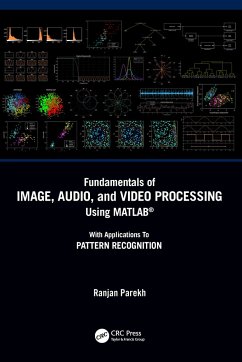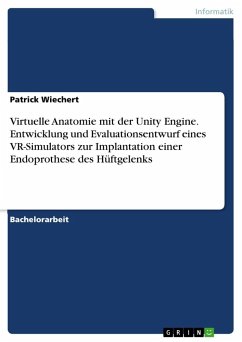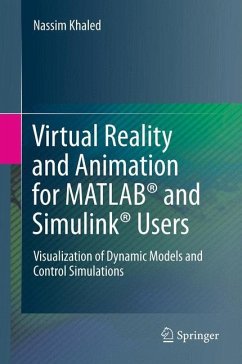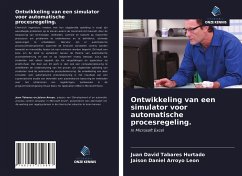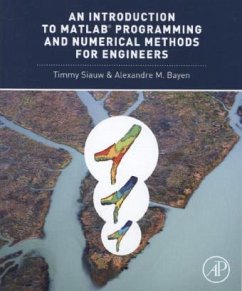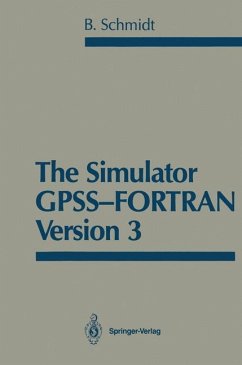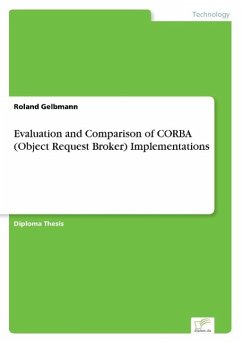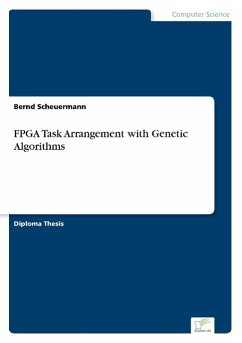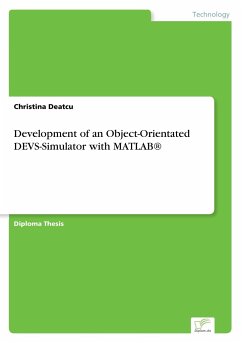
Development of an Object-Orientated DEVS-Simulator with MATLAB®
Versandkostenfrei!
Versandfertig in 1-2 Wochen
74,00 €
inkl. MwSt.

PAYBACK Punkte
0 °P sammeln!
Diploma Thesis from the year 2003 in the subject Computer Science - Software, grade: 1,1, University of Technology, Business and Design Wismar (Elektrotechnik und Informatik), language: English, abstract: Inhaltsangabe:Abstract:To solve problems of real world systems using scientific methods, the model-based approach is an effective and widely used method. To help rebuilding a system properly, there exist formalistic descriptions of systems behavior.One of several system specification formalisms, the DEVS formalism and associated abstract simulator algorithms provide the bases of this work. Th...
Diploma Thesis from the year 2003 in the subject Computer Science - Software, grade: 1,1, University of Technology, Business and Design Wismar (Elektrotechnik und Informatik), language: English, abstract: Inhaltsangabe:Abstract:
To solve problems of real world systems using scientific methods, the model-based approach is an effective and widely used method. To help rebuilding a system properly, there exist formalistic descriptions of systems behavior.
One of several system specification formalisms, the DEVS formalism and associated abstract simulator algorithms provide the bases of this work. The DEVS formalism offers ways to describe systems which change their state driven by events at discrete times.
Several implementations for computer aided simulation based on the DEVS formalism and associated abstract simulator concepts using object-orientated programming languages exist. One of those implementations, the MatlabDEVS simulation runtime system was modified and improved during this project and MatlabDEVS2, a modified version was developed. To make improvement possible, a proper understanding of the fundamental theories is indispensable. Hence, they are exhibited as a part of this work.
Because the modeler should be supported by the computer application while passing the process of modeling and simulation, the user interfaces are crucial for the quality of the system. The existing MatlabDEVS system did not offer any support for modeling and simulation, as well as it was not well documented.
Object orientated programming within the MATLAB® programming environment results in a complicated file structure representing the classes. This fact cannot be influenced. Hence, a GUI for modeling and simulation which creates the source code files for the classes was implemented.
The DEVS (Discrete Event Systems Specification) formalism introduced and developed by Zeigler is a formalistic way of describing systems which are subjects to event-driven changes of system states. An example for such a system could be any kind of sales office where something happens, if a customer arrives at the shop. The system then changes state, which means that the salesman is busy, or if he was already, the waiting queue grows. After a given time the customer is served and the system changes state again. Characteristically, the time base for such a system is continuous, this means a customer could arrive at any time not just at discrete times.
The DEVS formalism and associated simulator concepts have been implemented for simulation means in different ways using several object-orientated programming languages. To gain acquaintance of this field, first the general rules for modeling and simulation have to be exposed. Then an overview over system specification formalism is given and the DEVS formalism needs to be explained detailed.
Because the DEVS formalism includes a modular hierarchical concept, it fits well with the object-orientated programming paradigm and implementation with an object-orientated programming language is obvious.
The analysis of the MatlabDEVS simulation runtime system, which acts as starting-point, begins with the characterization of the object-orientated features of the MATLAB® programming language. The object-orientated programming within the MATLAB® environment differs quite a lot from object-orientated programming using for example C++, Java or Object Pascal.
Then MatlabDEVS, a simulation runtime system developed by Prof. T. Pawletta in 1998 and advanced as a diploma at the Wismar University of Technology, Business and Design and the Tomsk Polytechnic University by Issaev Artem in 2002, is explained and tested. The MatlabDEVS system is realized with the MATLAB® programming language and uses class definitions for both, model building and simulation.
MatlabDEVS implements the entire DEVS formalism well, but caused by MATLAB® s way of defin...
To solve problems of real world systems using scientific methods, the model-based approach is an effective and widely used method. To help rebuilding a system properly, there exist formalistic descriptions of systems behavior.
One of several system specification formalisms, the DEVS formalism and associated abstract simulator algorithms provide the bases of this work. The DEVS formalism offers ways to describe systems which change their state driven by events at discrete times.
Several implementations for computer aided simulation based on the DEVS formalism and associated abstract simulator concepts using object-orientated programming languages exist. One of those implementations, the MatlabDEVS simulation runtime system was modified and improved during this project and MatlabDEVS2, a modified version was developed. To make improvement possible, a proper understanding of the fundamental theories is indispensable. Hence, they are exhibited as a part of this work.
Because the modeler should be supported by the computer application while passing the process of modeling and simulation, the user interfaces are crucial for the quality of the system. The existing MatlabDEVS system did not offer any support for modeling and simulation, as well as it was not well documented.
Object orientated programming within the MATLAB® programming environment results in a complicated file structure representing the classes. This fact cannot be influenced. Hence, a GUI for modeling and simulation which creates the source code files for the classes was implemented.
The DEVS (Discrete Event Systems Specification) formalism introduced and developed by Zeigler is a formalistic way of describing systems which are subjects to event-driven changes of system states. An example for such a system could be any kind of sales office where something happens, if a customer arrives at the shop. The system then changes state, which means that the salesman is busy, or if he was already, the waiting queue grows. After a given time the customer is served and the system changes state again. Characteristically, the time base for such a system is continuous, this means a customer could arrive at any time not just at discrete times.
The DEVS formalism and associated simulator concepts have been implemented for simulation means in different ways using several object-orientated programming languages. To gain acquaintance of this field, first the general rules for modeling and simulation have to be exposed. Then an overview over system specification formalism is given and the DEVS formalism needs to be explained detailed.
Because the DEVS formalism includes a modular hierarchical concept, it fits well with the object-orientated programming paradigm and implementation with an object-orientated programming language is obvious.
The analysis of the MatlabDEVS simulation runtime system, which acts as starting-point, begins with the characterization of the object-orientated features of the MATLAB® programming language. The object-orientated programming within the MATLAB® environment differs quite a lot from object-orientated programming using for example C++, Java or Object Pascal.
Then MatlabDEVS, a simulation runtime system developed by Prof. T. Pawletta in 1998 and advanced as a diploma at the Wismar University of Technology, Business and Design and the Tomsk Polytechnic University by Issaev Artem in 2002, is explained and tested. The MatlabDEVS system is realized with the MATLAB® programming language and uses class definitions for both, model building and simulation.
MatlabDEVS implements the entire DEVS formalism well, but caused by MATLAB® s way of defin...





